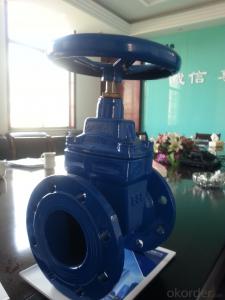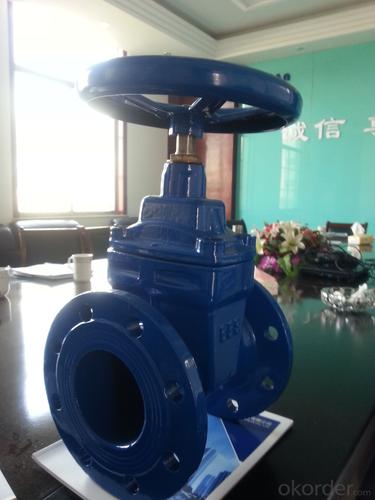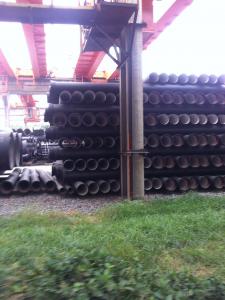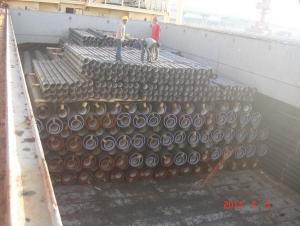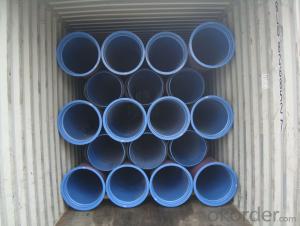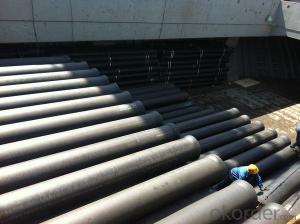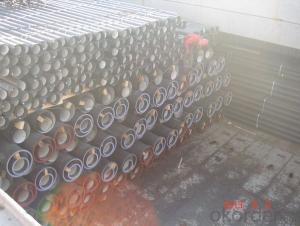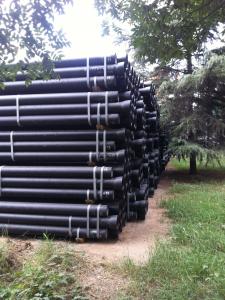DUCTILE IRON PIPES AND PIPE FITTINGS K8 CLASS DN1100
- Loading Port:
- Tianjin
- Payment Terms:
- TT OR LC
- Min Order Qty:
- 22 pc
- Supply Capability:
- 3000 pc/month
OKorder Service Pledge
OKorder Financial Service
You Might Also Like
Material : Ductile Cast Iron
Size Range : DN 80mm to DN 2000mm
Unit Effective Length : 6m or 5.7m
Manufacture Standard: ISO 2531:1998/ EN 545:2006/EN 598:2007
Annual capacity : 200,000 tons
Coating Exterior: Zinc 130g/m2 according to ISO 8179-1 and bitumen coating 70 microns.
Cement Interior: Portland Cement/ High Alumina Cement/ Sulphate Resisting Cement Lining according to ISO 4179
Special requirements on external coating and internal lining can be applied
We also provide accessories such as SBR/EPDM rubber gaskets, lubricant paste, pipe caps, PE sleeves, etc.
Additional Parts:
Each pipe is strictly inspected according to related standard to ensure permanently high performance.
Easy Installation at site and service free for life
Long Service Lifespan
Quotation will arrive you within 24hours once we get your inquiry.
We guarantee offering you a competitive price.
A copy of original inspection reports of pipes will be offered after shipment.
Photos of loading process will be sent to the customer after shipment effect.
We will follow-up the delivery progress after shipment effect and update to the customer on weekly basis.
- Q: Can ductile iron pipes be used for irrigation systems in saline soil conditions?
- Yes, ductile iron pipes can be used for irrigation systems in saline soil conditions. Ductile iron pipes are known for their durability and corrosion resistance, making them suitable for various soil conditions, including saline soil. Saline soil contains high levels of salt, which can cause corrosion and deterioration of certain materials. However, ductile iron pipes have a protective coating, such as cement mortar lining or polyethylene encasement, which provides an additional layer of protection against corrosion. This ensures that the pipes can withstand the corrosive effects of saline soil and maintain their structural integrity over a long period of time. Additionally, ductile iron pipes have a high tensile strength, making them resistant to cracks and breaks, which is important for irrigation systems that require a continuous and reliable water supply. Therefore, ductile iron pipes are a suitable choice for irrigation systems in saline soil conditions.
- Q: Can ductile iron pipe be used for hot water applications?
- Yes, ductile iron pipe can be used for hot water applications. Ductile iron pipe is known for its strength, durability, and high resistance to corrosion, which makes it suitable for a wide range of applications, including hot water systems. It can handle high temperatures and pressure, making it a reliable choice for transporting hot water. Additionally, ductile iron pipe's thermal conductivity properties allow for efficient heat transfer, ensuring that hot water is delivered effectively throughout the system. Therefore, when considering materials for hot water applications, ductile iron pipe is a suitable option.
- Q: Is the fire hose capable of using rapid repair joints?
- Installation joint. Insert the socket into the socket to coincide with the central axis of the pipe or pipe to be joined. Use a guide chain to tighten the pipe member until the pipe mouth enters between the two white lines.
- Q: How do ductile iron pipes handle ground movement in earthquake-prone areas?
- Ductile iron pipes are known for their excellent resistance to ground movement, making them a reliable choice for earthquake-prone areas. These pipes are designed to withstand external forces, including the ground shifting and movement caused by seismic activities. The flexibility of ductile iron pipes allows them to absorb and distribute the energy generated during ground movement. This flexibility is achieved due to the unique composition of ductile iron, which includes nodular graphite in its microstructure. The nodular graphite provides ductility and resilience to the pipe, allowing it to deform under stress without fracturing. When an earthquake occurs and the ground starts to move, ductile iron pipes can adapt to the changing conditions. They have the ability to elongate, compress, and bend, thus reducing the risk of pipe failure. This characteristic is crucial in earthquake-prone areas, as it helps prevent catastrophic failures and water loss that can occur with more rigid pipe materials. Moreover, ductile iron pipes have a high level of joint integrity, which further enhances their ability to handle ground movement during seismic events. The joints of these pipes are designed to withstand lateral and angular movement, ensuring that they remain intact and leak-free. In addition to their inherent flexibility, ductile iron pipes are often installed using techniques that enhance their resistance to ground movement. Anchoring systems, such as thrust blocks and restraints, can be utilized to secure the pipes and prevent excessive movement. These systems help to stabilize the pipeline network and further minimize the potential for damage during earthquakes. Overall, the combination of ductility, joint integrity, and anchoring systems make ductile iron pipes a reliable choice for handling ground movement in earthquake-prone areas. They provide a durable and resilient solution that can withstand the challenges posed by seismic activities, ensuring the continuous supply of water and minimizing the risk of infrastructure damage.
- Q: Are ductile iron pipes suitable for use in saltwater environments?
- Ductile iron pipes are generally not considered suitable for use in saltwater environments due to their susceptibility to corrosion. Saltwater is highly corrosive and can accelerate the degradation of ductile iron pipes. While ductile iron pipes offer good strength and durability, they have a higher likelihood of corroding in saltwater compared to other materials like stainless steel or corrosion-resistant alloys. Therefore, it is recommended to use materials specifically designed for saltwater environments to ensure long-term functionality and avoid costly repairs or replacements.
- Q: Can ductile iron pipes be used for both water and sewer applications?
- Yes, ductile iron pipes can be used for both water and sewer applications. Ductile iron pipes have excellent strength, durability, and corrosion resistance, making them suitable for carrying both water and sewage. They are commonly used in various water supply and wastewater systems due to their ability to withstand high pressure and resist chemical reactions caused by sewage.
- Q: Can ductile iron pipes be used for cooling water systems?
- Indeed, cooling water systems can utilize ductile iron pipes. Renowned for their resilience, robustness, and resistance to corrosion, ductile iron pipes are a fitting choice for various applications, including cooling water systems. With the ability to withstand high pressure and temperature fluctuations, these pipes excel in circulating and transporting cooling water. Moreover, their smooth interior surface mitigates friction, diminishing the likelihood of scaling or blockages and enabling the efficient flow of cooling water. Consequently, ductile iron pipes emerge as a dependable and efficient option for cooling water systems.
- Q: Are ductile iron pipes resistant to freeze-thaw cycles?
- Yes, ductile iron pipes are generally resistant to freeze-thaw cycles. Their high tensile strength and flexibility allow them to withstand the expansion and contraction caused by freezing and thawing without significant damage. However, proper installation and maintenance practices should still be followed to ensure long-term durability.
- Q: What is the difference between cast iron pipe and seamless steel pipe and galvanized steel pipe?
- Galvanized steel pipe: divided into cold galvanized steel pipe, hot galvanized steel pipe, cold galvanized steel pipe has been banned, and the latter is also advocated by the state for the time being. In 60s and 70s, developed countries began to develop new types of pipes, and galvanized pipes were banned. China's Ministry of construction and other four ministries also issued a civilization, indeed from two, 000 years since the galvanized pipe as a water supply pipe, the New District cold water pipe has rarely used galvanized pipe, and some of the hot water pipe is galvanized pipe. Hot dip galvanized steel pipe is widely used in fire, power and highway.
- Q: Can ductile iron pipe be used for water distribution systems in cold climates?
- In cold climates, ductile iron pipe is an ideal choice for water distribution systems. This type of pipe is renowned for its strength and durability, making it suitable for a range of applications, including water distribution. Its exceptional ability to withstand external forces, such as freezing temperatures, frost heaving, and ground movement, is particularly advantageous in cold climates. Furthermore, ductile iron pipe exhibits a high tolerance for temperature fluctuations, ensuring its reliability for water transportation even in extreme cold conditions. Additionally, its corrosion-resistant properties guarantee the long-lasting and dependable performance of the pipe, even in harsh environments. Therefore, when it comes to water distribution systems in cold climates, ductile iron pipe is the optimal choice.
Send your message to us
DUCTILE IRON PIPES AND PIPE FITTINGS K8 CLASS DN1100
- Loading Port:
- Tianjin
- Payment Terms:
- TT OR LC
- Min Order Qty:
- 22 pc
- Supply Capability:
- 3000 pc/month
OKorder Service Pledge
OKorder Financial Service
Similar products
Hot products
Hot Searches
Related keywords
